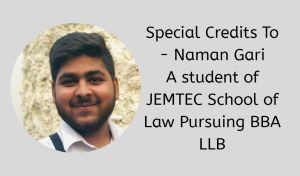
INTRODUCTION
Advocate
According to the advocates act 1961 advocate may be defines as-
- Section 2(a) “advocate” means an advocate entered in any roll under the provisions of this Act;
- section 2(h) “law graduate” means a person who has obtained a bachelor’s degree in law from any University established by law in India;
- section 2(i) “Legal practitioner” means an advocate [or vakil] or any High Court, a pleader, mukhtar or revenue agent;
- advocates are the person who can do legal practice in the court and follow legal services.
Advocate on record
Advocate on Record is a advocate who is entitled under the Order IV of the Supreme Court Rules, 2013[1] (beforehand Order IV of the Supreme Court of India Rules, 1966), confined under Article 145 of the Constitution.
They practice online in supreme court of India and has the power to file the case in supreme court and no other advocate had this kind of designated power.
Who are advocates
Advocate, in law, an individual who is expertly able to argue the reason for another in an official courtroom. As a specialized term, advocate is utilised for the most part in those legitimate frameworks that got from the Roman law.
In Scotland the word alludes especially to an individual from the bar of Scotland, the Faculty of Advocates.
In France advocates were in the past a composed collection of pleaders, while the readiness of cases was finished by avoués; today this qualification exists just under the watchful eye of the redrafting courts.
In Germany, until the differentiation among guide and pleader was annulled in 1879, the Advokat was the counselor instead of the pleader.
The term has customarily been applied to pleaders in courts of ordinance law, and in this manner in England the individuals who rehearsed under the watchful eye of the courts of common and standard law were called advocates.
In the United States the term advocate has no extraordinary hugeness, being utilised reciprocally with so much terms as lawyer, guidance, or attorney.
Advocates are the person who got registered with bar council of India and can practice in various Courtrooms.
And whereas lawyers are the person who acquired the degree of LLB, BALLB(H), or graduate degree with law course its a professional course.
The foundation of each nation is its economy and peace. The explanation after the demolishment of government each nation presents the legal framework and makes laws to profit the kinsmen. This legal framework deals with a chain of importance premise and is sorted in different kinds.
In India most elevated situation in the legal executive is Chief justice of India, by and by this position has a place with SHARAD ARVIND BOBDE.
At that point comes another board of Supreme Court judges and afterward higher court judges and afterward lower court judges and afterward come advocates and the legal advisors and assistants and so forth.
After appointed authorities, the most persuasive situation in the equity framework is that of advocates. They are the main individuals who are approved to show up in a legal dispute for the gathering’s sake.
According to the Advocates Act, 1961, the bar board enrolment and a law degree is an absolute necessity for a promoter.
Lawfully, just promoters are qualified for provide legal counsel. They give legitimate exhortation to the gathering against whom the claim is documented or who needs to record a claim.
Advocates plan cases and present contention in court for the customer who has marked the vakalatnama in this manner approving the advocate to do as such. A few solicitors set up the cases for advocates however can’t contend in court.
The Advocates Act 1961 oversees the law identified with the lawful calling. It comprises the State Bar Council and Bar Council of India. An individual who is enlisted under the Advocate Act,1961 is called Advocate on Roll and can specialize in legal matters all through the nation.
In any case, advocates on move of one State Bar Council can’t be on the Roll of another State Bar Council, at the same time. Advocates have two classes, Senior Advocates and different solicitors.
Senior advocate is a differentiation offered by the High court or Supreme court to any promoter who has uncommon information or involvement with law.
The concerned advocate has the ability to acknowledge or deny such an offer. The senior advocate can’t show up in Supreme Court without a advocate on record and advocate on roll in some other council or court. Disciplinary locale is drilled by State Bar Council over Advocates on roll
DUTIES OF THE ADVOCATE
According to section 49 of advocates act 1961 various duties are assigned to advocates such are under
Duties towards client
- The interest of the client should be protected
- The value of services and legal advice must be properly estimated
- Duties towards court
- Advocate should give Respect in the court and speak honesty before the court.
- Advocate had to prepare the case with full enthusiasm and with full of hardwork
Other than these, the advocates are limited from promoting either in a roundabout way or straightforwardly.
The nameplate of the advocate should be of sensible size and can’t embroil his itemized qualifications like he is leader of Bar Council or had been Advocate-General, and so forth.
He can’t allow to do soliciting for the votes and can’t permit his name to be related with illicit issues by any law office.
He can likewise not charge any expense for letting somebody train under him to fit the bill for enrolment.
Likewise, advocates are disallowed to enter appearance when effectively another promoter has been locked in for the equivalent aside from with the authorization of that advocate.
In the event that the advocate neglects to create such assent, at that point he can just show up with the court authorization by giving a legitimate explanation.
Any ADVOCATE found infringing upon the standards of Bar Council will be understood as unfortunate behavior and will have outcomes as chosen by the Supreme Court.
ADVOCATE ON RECORD
After Senior Advocates the following powerful situation in the Supreme Court is of Advocate-on-record. He is an ADVOCATE who needs to breeze through a passing test of the Indian Supreme Court.
Just those advocate who have been selected for at any rate 5 years with Bar Council and have been prepared for one year under Advocate on Record who has 5 years of remaining in the Supreme Court, can take this test.
According to the Order IV of Supreme Court Rules in Article 145 of the constitution can argue or represent the gathering in Supreme Court. By similar guidelines documenting of appearance or contending for the gathering is just qualified for advocate-on-record.
Be that as it may, if the advocate on-record can train any supporter to show up or argue in any issue.
Capability
A advocate can be enlisted as an advocate on record in the event that they qualify the necessities as set down in the Supreme Court of India Rules, 1966.If advocate needs to rehearse as a advocate on-record in the Supreme Court, they need an extra capability.
The advocate needs to rehearse for a long time as a advocate and from that point needs to exhibit to the Supreme Court that they have begun taking preparing with a Senior Advocate on record since they mean to turn into an Advocate-on-record.
After the expiry of one year’s preparation, the advocate needs to show up for an assessment directed by the Supreme Court itself.
After a advocate breezes through this assessment they should include an enrolled office inside a range of 10 miles from the Supreme Court building and an enlisted representative. It is after this that the Chamber Judge of the Supreme Court acknowledges them as an advocate on-record.
Charges of the advocate
The Second Schedule Part I of Supreme Court Rules, 2013 notices charges payable to advocates in different settings. Some are referenced underneath;
For safeguarded suits, claims or reference under Article 143 or 317 (I) of the constitution or Article 32 of the constitution charge for driving advice is Rs24,000 and Rs12,000 for a partner supporter or backer on record, assuming any.
For undefended interests Rs14000 and no boost expenses
An appeal for Special leave by driving advice Rs 8000 and Rs 4000 for a advocate on record when just teaching
Notification for movement other than petitions in Article 32 for driving advice Rs12000 per appearance.
CONCLUSION
as we got to know that from above research that ADVOCATE ON RECORD is also a advocate but they only do work in supreme court of india which is the apex body of the court.
If anybody files a casein supreme court they should apply through advocate on record. So advocate on record is also called as advocate OR SOLLICITOR but with higher powers and experience.

- RSPCB Recruitment 2023 | Law Officer | Last Date 17th November | Apply Now !

- NFL Recruitment 2023 | Management Trainee (LAW) | Apply Now !

- PGCIL Recruitment 2023 | Officer Trainee | LAW | Apply Now

- HPD Assam Recruitment 2023 | 302 Public Prosecutor | Last Date 30th November | Apply Now

- Supremacy of the Constitution or Parliamentary Sovereignty

- National Education Policy 2020 Highlights – NEP Objectives

- Law Graduate Jobs | Naks & Partners (Advocates & Solicitors) | Associate Legal (Drafting & Research) |

- International Health Regulation By: Prof.(Dr.) Pallavi Gupta, HOD JEMTEC School of Law

- CALL FOR INTERNS: JULY MONTH

- [Online] Interactive Certificate Course on Competition Law & Practice by MyLawman [Register by 17 June]


Leave a Reply
You must be logged in to post a comment.